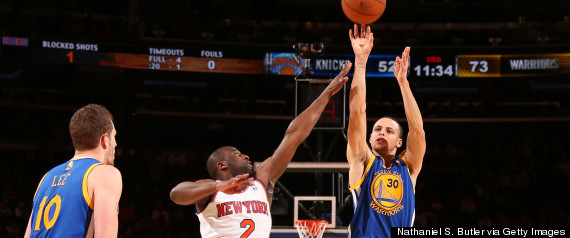The annual MIT Sloan Sports Analytics Conference in Boston is a forum to talk big ideas and basketball. So during this past weekend's conference, it was no surprise when the concept of the four-point play came up for debate. The idea has generated a firestorm of controversy, and rightfully so. Rule changes happen often, and they can represent the growth of basketball. Don't forget that the NBA implemented the three-point shot in 1979, a change that's still drawing the ire of naysayers more than 30 years later. The three-point shot revolutionized basketball, re-shaping the way players play and coaches coach. But the four-point play -- even though it may sound like another step forward -- is not the right move for the league.

One of the distinct beauties of the three-pointer is the way it's opened up the entire floor. The threat of it (think Stephen Curry) expands defenses away from the hoop, which in turn allows for more driving lanes and spacing for the offense. Instituting a four-pointer might seem like a good idea -- for one thing, it could end up spacing the floor more -- but it would also be a drastic measure for a game that doesn't need to take one. Instead, why not open up the court by actually expanding its dimensions?
Strangely enough, the NBA court has kept the same exact dimensions, 94 feet by 50 feet, since the middle of the 20th century. And it's done so despite the fact that the average player is now 25 pounds heavier and 3 inches taller than when that court size was first established.
The league could instantly improve its game by adding just a few feet to the size of the floor. More square footage would increase the size, strength and speed of the NBA without sacrificing the integrity of the game the way a four-point shot might. You'd get more excitement, and players wouldn't need to camp out from 30-plus feet away to hoist a low-percentage, long-range perimeter shot.
Ever since its inception, the three-pointer has helped keep blowouts watchable because of the ever-present threat of the comeback. The existence of a three-point shot means that seemingly no lead is insurmountable, and that is a good thing, but only to a certain extent. The four-point play could very well nullify the positives of the three-pointer. NBA post-passing efficiency already rewards teams that can play inside-out and make the three -- Miami leads the league in that category, for example. Implementing a four-pointer would be a fix for something that doesn't need fixing.
Perhaps George Karl, the 2013 NBA Coach of the Year, summed it up best. "The 3-point play has had a powerful effect on our game," Karl told ESPN. "I think a 4-point play would be too dramatic and too drastic. The presence of the paint is important and must continue to be the soul of the game. If we put a 4-pointer out there and reduce everything down to a long jump shot, it takes away from the concept of moving as a team and working as a team."
Email me at jordan.schultz@huffingtonpost.com or ask me questions about anything sports-related at @Schultz_Report and follow me on Instagram @Schultz_Report. Also, be sure to catch my NBC Sports Radio show "Kup and Schultz," which airs Sunday mornings from 9-12 EST, right here.
